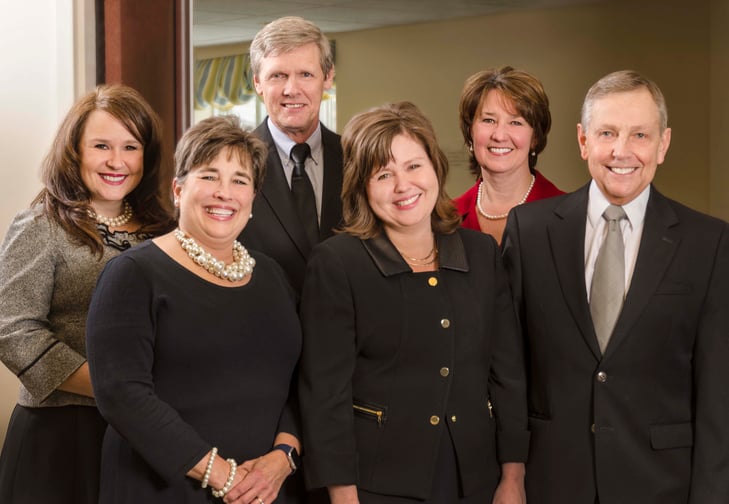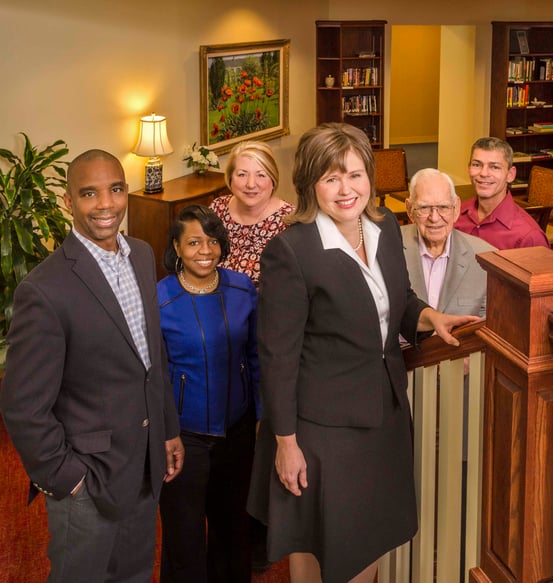
Our new President and CEO, Laura Lamb, knows a thing or two about the history of senior care in Cincinnati. She’s been with Episcopal Retirement Services for the past 23 years — ever since she received her Master’s degree in health administration from Xavier University.
But it could be argued that she was born into senior care.
Lamb’s mother was a nursing assistant and worked full-time at a Tristate nursing home, even as she raised Laura and her sister by herself. The girls would sometimes accompany their mom to work on weekends or after school.
And those trips to the nursing home with her mother taught Lamb something about the value of elder care. She watched her mom interacting with residents, building relationships with them, and came to understand that the best senior care is built on trust. Trust between residents and their care providers, and trust between families of residents and the staff of a retirement community.
She also came to understand that older people can — and do — make valuable contributions, and that those contributions shouldn’t just be encouraged. They should be nurtured. And that’s why she set about to do it.
Highlighting our elders’ wisdom
Lamb has been one of the key players in the creation of Episcopal Retirement Services’ Council on Lifelong Engagement (CLLE).
The CLLE pairs elder residents with area teachers and students, allowing them to pass on their career and life expertise to young people. At the same time, it combats ageism by showing younger people how much the wisdom and experience of older people mean to a thriving community.
“With families living all over the country today, grandparents often live in another place. Because of that, many children don’t have the chance to form deep and meaningful relationships with elders,” Lamb explained.
“If retirement communities can partner with schools to have elders, based on their experience and knowledge, teach part of the curriculum, it can over time change the way students think about aging. CLLE has become part of our outreach ministry for ERS,” she said.
“The thing that gets my back up is when people disrespect and devalue elders,” Lamb said. “I want to live in a society that values elders. The whole purpose of the Council for Lifelong Engagement is to eradicate ageism.”

Making Cincinnati “Elder City USA”?
“Eradicating ageism is a bold goal, and I’m not going to do it alone,” Lamb said.
She is quick to point out that the country’s population is rapidly aging, and that’s presenting significant opportunities not only older people and their working-age children, but for state and local governments, for the health care system and for senior care providers like ERS to improve the aging experience.
“My dream for the future is that we at ERS, along with other partners, make Cincinnati the most dementia-friendly city in the country,” Lamb said. “We are talking with a number of people and organizations about how we can accomplish that, including the local chapter president of the Alzheimer’s Association and Cincinnati’s vice mayor.”
One of the ways that ERS is making Cincinnati dementia-inclusive and elder-inclusive is through the Affordable Living initiative, which rehabs and refurbishes older properties in economically challenged neighborhoods, turning them into mixed-use communities that provide sorely-needed apartment spaces for seniors of limited means.
“My dream for the future is that we at ERS,
along with other partners, make Cincinnati the most dementia-friendly city in the country”.—Laura Lamb, President &CEO
In addition to the various projects opened last year, including Central Parkway Place in downtown Cincinnati’s refurbished, historic YMCA building, Affordable Living by ERS will in 2017 open several communities in and around Cincinnati, as well as senior apartment re-developments in New Carlisle and Dayton, Ohio, and Lexington, Kentucky.
“I think ERS has a real opportunity ahead as we continue to serve our residents and staff and advance our mission,” Lamb said.
“My day-to-day philosophy is that I ask all of us to be in relationship with those we serve, which not only means residents, but our staff, donors, volunteers and our community. It all starts with showing respect and appreciation.”












